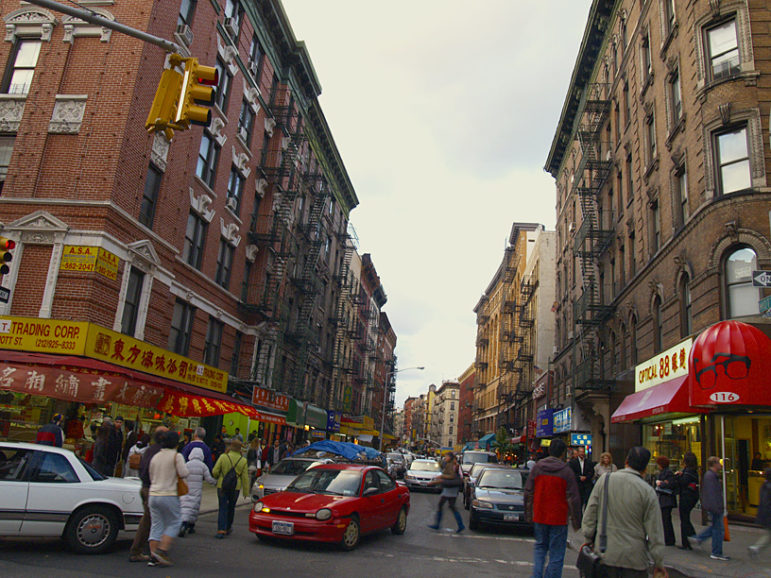
tsushima
While a district where Asian voters make up 42 percent of the electorate has a great chance of electing an Asian representative, the presence of more than one Asian candidate on the ballot (let along three) makes it very likely one of the non-Asian candidates will prevail.
Summer is normally a quiet time in the city, at least in terms of big news breaking. The City Council isn’t in session. Schools are closed. Half of the city’s population seems to be on vacation and the other half are planning for it. And reporters, struggling to find enough stories to fill the pages, gain a nervous twitch or two.
Not in Chinatown. Not this year. Not with all the candidates running for the seat vacated by the disgraced former Assembly Speaker Sheldon Silver, which was temporarily filled by a special election in April but is on the ballot again in the September Democratic primary election.
It is a huge political prize: A safe Democratic seat with no term limits. The next winner may stay for many years just like Silver did.
The fierce battle among the candidates— six of them including three Chinese—is as scorching as New York’s hot, sticky summer weather. Catfights have already started, with at least one candidate complaining that rivals have been tearing down his posters. But what’s more interesting to watch is whether or how Chinatown is going to unite in supporting one Chinese candidate
While a district where Asian voters make up 42 percent of the electorate has a great chance of electing an Asian representative, the presence of more than one Asian candidate on the ballot (let along three) makes it very likely one of the non-Asian candidates will prevail.
The voters in Chinatown have learned that in a hard way. In the City Council election of 2001, when there were three Chinese candidates on the ballot, victory went to white attorney Alan Gerson. Chinatown waited for another eight years to see its first Chinese representative when Margaret Chin, one of the three defeated in ’01, came back to win the seat in 2009.
But the latest warning came from, surprisingly, retiring Rep. Charles Rangel’s Congressional District 13. Despite their geographic and demographic differences, the two districts at least have one thing in common: They are both changing hands after being controlled by the same politicians for almost half a century, and have therefore generated crowded fields.
In the Congressional primary in June, nine candidates chased after the Democratic nomination in district 13, including five blacks and two Latinos. In a district where the majority changed from black to Hispanic after a 2012 redistricting, the Black community suffered deeply from the diffusion of votes, and the district elected Adriano Espaillat, its first Hispanic representative.
In Chinatown, people were watching closely. Members of the Chinatown United Democratic Organization (UDO), a club that backs one of the three Chinese candidates, Yuh-line Niou, have started to test the water for having a tripartite dialogue to leave only one Chinese candidate in the field. “We have to learn a lesson from Harlem. This is the once-in-a-lifetime opportunity for Chinatown to elect a Chinese Assemblyman. We cannot blow it,” said Virginia Kee, co-founder of the UDO.
But that seems to be a long shot. Don Lee, one of the other two Chinese candidates, agrees that one candidate has a better chance than three. But unsurprisingly, he doesn’t agree with Niou’s team on who that one candidate should be. And Gigi Li, the other Chinese aspirant, was not so convinced when I asked her about the idea, insisting the principle of democracy meant voters should have as many choices as possible
Other community leaders watch in despair. They shake their heads and start babbling about the good old days when Chinatown had a gangster-style grandpa who had the magic powers to get consensus in any situation and with anybody.
What intrigues me most about this drama is not how it ends, but how it reflects so many dilemmas, so much confusion and all the cultural clashes an immigrant community may face when it comes to an election.
The Chinese culture emphasizes the collective interest rather than that of an individual. We were taught from childhood to sacrifice ourselves for our families and our countries. But is it really possible to ask three Chinese candidates who grew up in the U.S. and soaked up the individualism of American culture to give up their own dreams for the interests of the community?

No Backspace is City Limits' blog featuring a recurring cast of opinion writers passionate about New York people, policies and politics. Click here to read more..
In addition, Li might be right about the principle of democracy. But for a fledgling community in the political arena, how do you balance this principle with a winning strategy?
But all in all, what fundamentally perplexed me is why, in a country and city that so often sees such rigid attention to political correctness, it raises so few eyebrows for an ethnic community to openly seek to elect “one of its own”?
In some multicultural Asian countries like Singapore, where any racial conflict is an extremely sensitive topic, such words may get you in serious trouble with the democratically-elected (though in some of its approaches a relatively authoritarian) government. Fortunately, people in the U.S. can talk about electing a Chinese person, or a Latino, or a Pole, or a Pakistani, all they want. The question is whether it’s a good idea for them to do so. Shouldn’t the voters talk about voting for someone who can best serve them more than someone who looks like them?
Yes, I know this is a naïve question. In my more than 10 years covering the Chinese community as a journalist, I have seen Asian elected officials like John Liu, Grace Meng, Peter Koo and Margaret Chin do more for the community than all the white, black and Latino politicians put together. In the first year of Liu’s Council term, Lunar New Year was listed as a holiday on the city’s alternate parking calendar. Grace Meng helped ban the word “oriental” in federal government documents. And all of them helped many family members of Chinese deliverymen killed in the city to get expedited visas to come here for the funerals.
This is the gloomy reality, a reality where the line between “you” and “me” has to be drawn clearly for pragmatic reasons, and a reality where, I suspect, racial tension lays its seeds.










2 thoughts on “No BackSpace: In Primary Race, Voter Choice Could Thwart Ethnic Achievement”
I disagree with the Sing Tao reporter that a non Chinese candidate will prevail. Neither Alice Cancel nor Paul Newman seem to be campaigning and Don Lee’s posters are all over the place. Furthermore, he and his sister claim a rent controlled apartment on Mott Street while he claims to be concerned with affordable housing and they have ignored repeated access requests and dehoarding requests.
Would Sing Tao like to post photographs of their apartment?
Are GIgi Li and Yuh Lin Nioue throwign this election for him? Was this the plan all along? Because only his posters are plastered all over Chinatown and they were advised and did not follow up on the fact that his landlady at 117 Mott Street has problems with him and is willing to speak to the media and show them her recordings about him and his sister Susan Lee.
Would Sing Tao like to publish the multiple emails going back months the year before last when Chan Wing Yeung’s sister claimed the murder victim’s widow was prone to turning off the heat in the winter time?
Coincidentally, Don Lee ignored emails requesting access to his unit that was frustrating the nonChinese tenant in the apartment below.
We also can show that no one used the bathroom shower, sink and kitchen sink drains for years in the apartment they are warehousing and not using which violates the morality of affordable housing. We found two pieces of the waste pipe with huge holes in them and in our building even a tiny pinprick will result in the ceiling of an apartment below.. In their case, it was a flood because the pipe had been dry from nonuse for so many years and some kind of corrosive chemical had been poured into it that the holes were massive.
This is the future assembly leader for Lower Manhattan?
Really?
So why doesn’t this reporter from Sing Tao and Global Times publish our evidence – tapes and photos. We can also prove that the AAFE tenants committed perjury because they each took turns calling every weekday and then told the judge that the landlord ignored them and never answered questions.